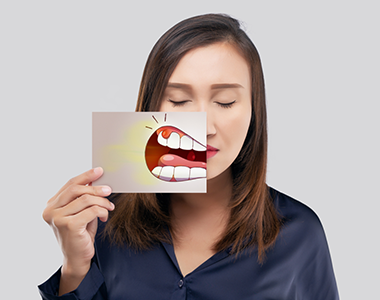
What Causes an Abscessed Tooth and How You Can Avoid Them
Category : Gentalcare
A tooth abscess also called an abscessed tooth, is right up there with root canals, subjects that we all need to be aware of to have a clear understanding of what to do if we have an abscess as well as how to avoid ever having a tooth abscess.
Anyone who has ever had an abscessed tooth would tell you that they would have done anything to avoid the pain of an abscess. In this first article on dental abscesses, let’s explore what causes abscesses and strategies you can apply to avoid ever having one.
What is an abscessed tooth?
An abscess simply is a ‘pocket’ of pus from an infection in the mouth. Have you ever had a splinter in your finger or foot that got infected? Do you recall the pus that accumulated around the splinter? That was your immune system showing up to fight the infection. Well, that’s essentially what an abscess is: a collection of pus that the immune system has created to mount a defense against infection.
There are two main types of abscesses in the mouth. A periodontal abscess originates in the gum pocket and is directly associated with advanced gum disease, also called periodontal disease. A periapical abscess is located at the tip of the root of a tooth. We’ll refer to these two main types of abscess simply as a gum abscess or tooth abscess.
Common signs of abscess
Signs and symptoms can vary widely depending on the type of abscess you’re dealing with. Where gum abscesses aren’t necessarily painful, the main sign of a tooth abscess is a very strong constant pain.
What causes an abscess?
All abscesses (with a couple of rare exceptions) are a result of a chronic infection.
If the infection originates in the gum pocket, then gum disease is the cause of the abscess.
If the infection is located at the tip of the root of the tooth, then the abscess is the result of an infection from within that tooth or the region surrounding that tooth.
In both cases, the immune system is dealing with an infection. However, different than the splinter example above, these infections are chronic.
Gum (periodontal) abscesses are from gum disease, an imbalance of disease-causing microbes that have colonized under the gum line.
Tooth (periapical) abscesses are primarily caused by a tooth becoming so decayed that the pulp becomes infected. They can also occur from a root canal gone bad. In both cases, the health of the tooth is severely compromised, a major battle is cooking, and the abscess is the ‘sign’ of trouble.
(Incidentally, the photo on this post is an x-ray where the abscess is on the root of a tooth that has already had a root canal performed on it. As you can see in the photo on the adjacent teeth, on a healthy tooth the root chamber is darker than the bony enamel and dentin.
However, on this root canal tooth, the root chamber is bright white showing how the root has been drilled out and filled with a material that the x-ray shows as white.)
How do I know which type of abscess I’m dealing with?
While this may get a bit graphic for some, the location where the abscess tries to drain the pus will give you a big clue whether you are dealing with a gum disease-based abscess or a tooth-based abscess.
You see, one of the ways our immune systems show up to fight an infection is by recruiting a lot of white blood cells to the infection site. Once the white blood cells do what they can, they die and accumulate at the infection site. We know this accumulation of dead white blood cells as pus.
Once the pressure builds up in the abscess, it tries to find a way out to relieve the pressure. Seeing where the abscess ‘vents’ is very helpful to determine which type of abscess you’re dealing with.
If the pus comes from within the gum pocket, this is a sure sign of a periodontal abscess and an unquestionable sign that you have periodontal disease.
If, however, the pus forms a boil on the side of the gum tissue and ruptures into the mouth (I know, it’s gross but important), then this is a strong sign that it’s a tooth abscess. Also, please note that it’s possible to have an infection and resulting abscess of both the periodontal pocket and the tooth root.
Sometimes a person can have an abscess (aka strong pain associated with a region in the mouth) and not have any ‘external’ signs of an abscess through the expression of pus from the infection site. These abscesses are particularly problematic as the increasing pressure of the abscess doesn’t have anywhere ‘outside’ to go, so the pus ruptures into internal tissues.
Why abscesses are not to be ignored
It’s a chronic infection. At the risk of being a bit dramatic, chronic infections are the ‘stuff’ that living beings die from. The extreme pain associated with an abscess is there to shout ‘Pay attention to this area! We’ve got trouble over here!’.
If left untreated, an abscess originating from gum disease will continue to destroy the jaw bone that anchors the teeth in the mouth and causes tooth loss as well as provides a chronic source of ‘thug bugs’ that directly undermine the health of the whole being.
If a tooth abscess is left untreated, the infection will build and spread into the surrounding region, destroying any tissue (bone, muscle, doesn’t matter) in its path as it seeks a way to release the building pressure. Depending on the location of the abscess, it can even directly cause loss of vision, facial paralysis, and yes, even death.
While these mostly localized issues are big enough, recent research very clearly points the finger at chronic oral infections as being a major source of systemic inflammation. Systemic inflammation is the underlying cause that drives heart disease, cancer, arthritis, diabetes, and many other ‘big hitters’ in our global culture.
An abscess is one of those situations where a trip to your helpful dentist would be a really wise choice.
How to avoid ever having an abscess
While this subject of how to avoid having an abscess is bigger than we can cover in one article, let’s get you headed in the right direction right now.
We suggest addressing any oral health issue from a ‘two prong’ approach.
On one hand, we must address this issue ‘at the site’ of the infection. On the other hand, if we want to stop the risk of an abscess for good, we must strengthen our ‘whole system’ immune response.
After all, only if we raise the health of our whole system can we expect our immune system to be able to effectively stop chronic infections.
To explain why system-wide immune support is foundational, let’s use the analogy of a city fire department. If a city has a building on fire, the fire department shows up in a hurry and applies the full force of their firefighting capabilities to put out the fire. This is how we want our immune system to function.
What happens, however, if the city has 10, 50, or 100 fires burning all at once? The fire department can’t respond to all the emergencies, right? They just don’t have the resources to address all the fires sufficiently.
So, they determine which fires are more critical to get under control and which fires can be allowed to burn.
Another option the fire department has is to spread their forces thin and just try to control all the fires from getting bigger. But spread out too thinly, they lack the resources to be able to mount a strong enough defense to put out any of the fires. So they all smolder and slowly burn.
This analogy parallels what happens in our bodies every day. If we don’t do the right things to support greater whole being immunity, we are simply going to stretch our immune systems too thin and some fires (infections) are going to keep burning and not be addressed.
Real-time solutions…
Ok, enough theory. Let’s get you some high ‘bang for the buck’ actions you can take to make a massive positive change to your oral health…
1. Oil pulling
Oil pulling is super helpful for addressing oral health challenges because it supports both the ‘in the mouth’ needs and ‘system-wide’ immune function. We question whether oil pulling will single-handedly heal an abscess, but regular oil pulling is a great adjunct therapy to help create greater oral health. While sesame oil is traditionally used, we like to use coconut oil because of its flavor and its antimicrobial properties.
If you aren’t familiar with oil pulling, here’s an article that explains how to practice oil pulling as well as how oil pulling benefits our oral health and whole-body wellness.
2. Address the infection in the mouth head on
There is much you can do to help knock down an oral infection. If it’s a periodontal abscess, you can directly and significantly reduce the infection yourself. Check out our HealThy Mouth System for more information on how you can make huge changes in your oral health very quickly.
Through the use of natural antimicrobials combined with specific strategies to help mitigate the imbalance of thug bugs in the mouth, it’s amazing how quickly the body heals itself (yes, even from advanced gum disease).
Another option is to vigorously swish with salt water for several minutes. Vigorous swishing like oil pulling will activate the immune system in the area while the salt works to fight the infection. Just dissolve some salt in water and you have a powerful, inexpensive home remedy to support the healing process.
3. Support systemic immune response
The good news is taking immediate positive actions will make a huge change quickly. Eat foods that help support greater oral health. Reduce or eliminate foods that undermine your oral health. Make sure you take time to laugh and play. Even simple steps like taking more vitamin C can help.
Any of these steps will provide your ‘fire department’ with more resources to mount a better, stronger immune response.
https://orawellness.com/what-causes-an-abscessed-tooth-and-how-you-can-avoid-them/

 Review Us
Review Us  Review Us
Review Us 